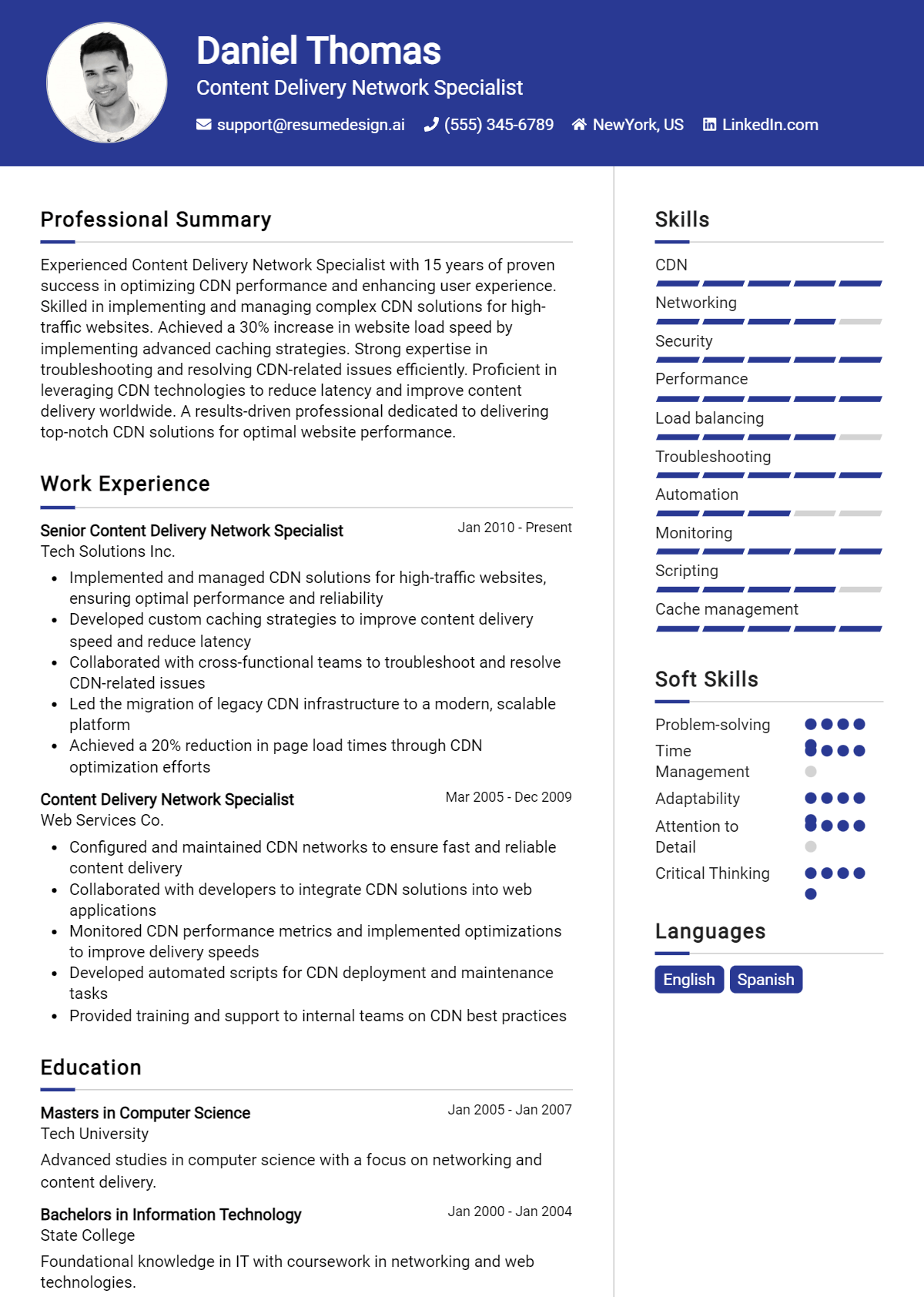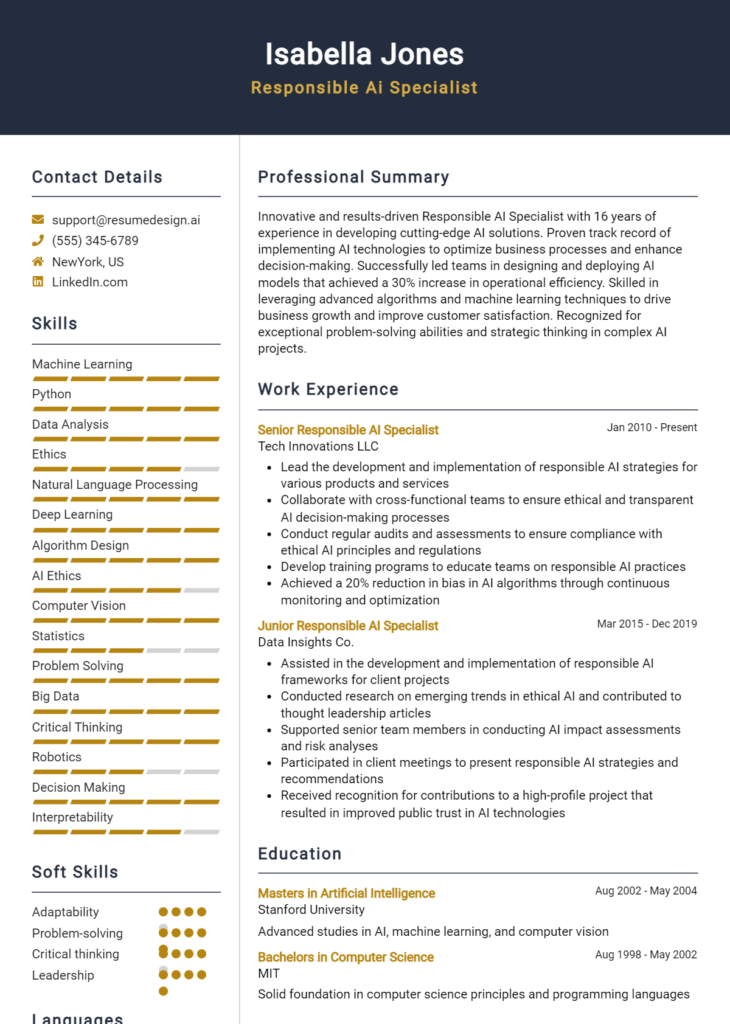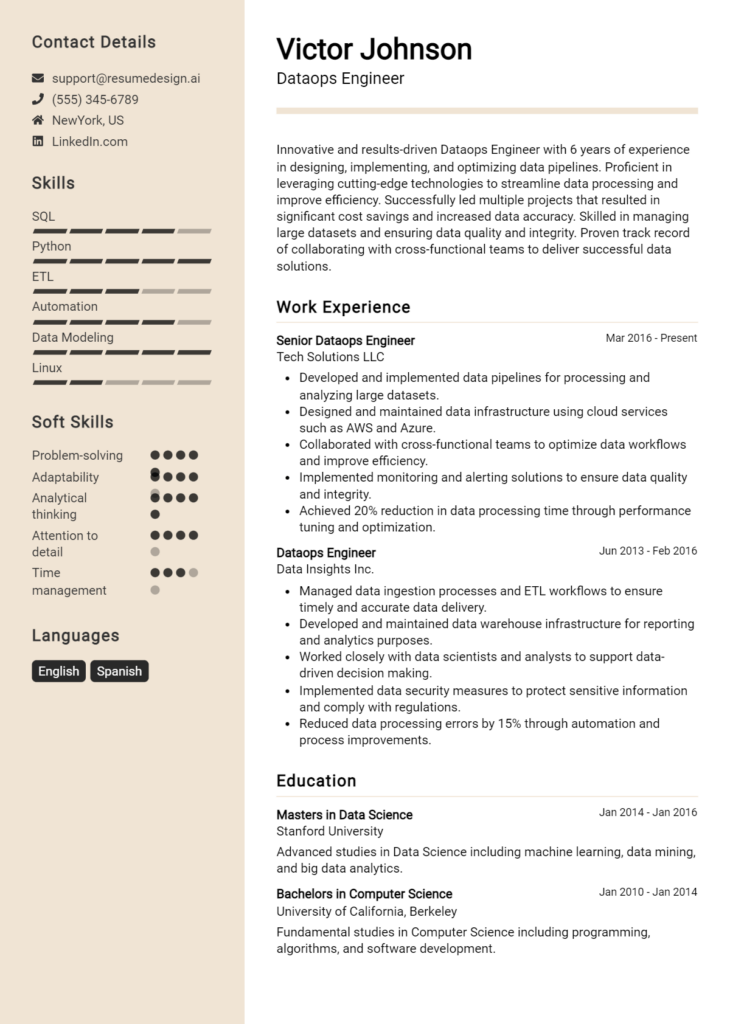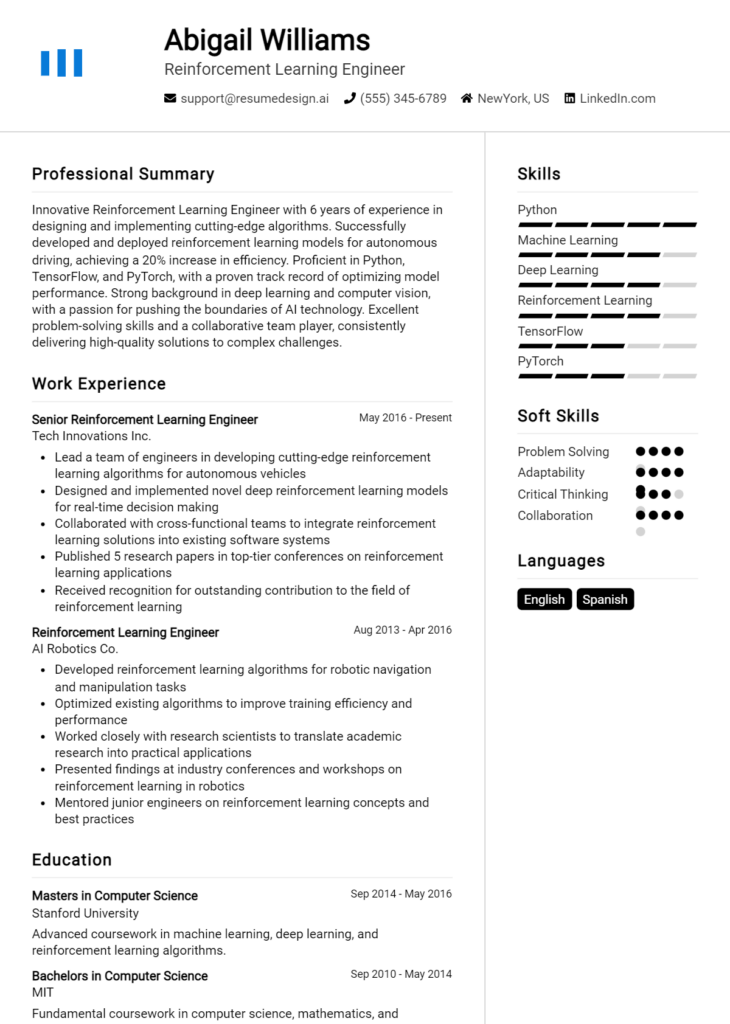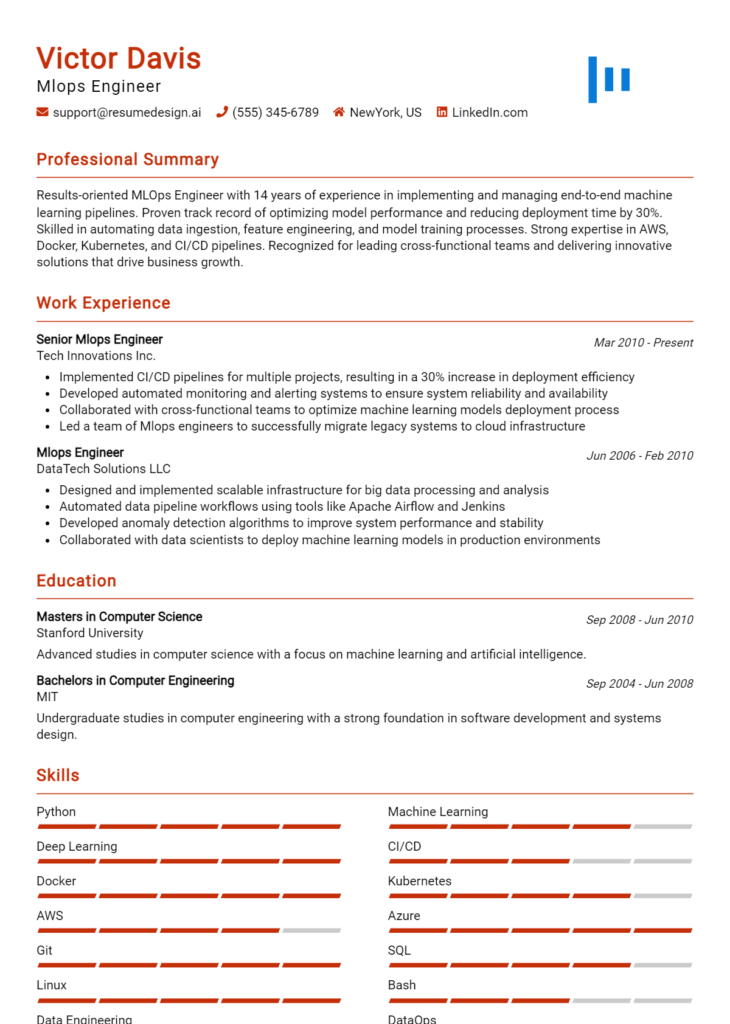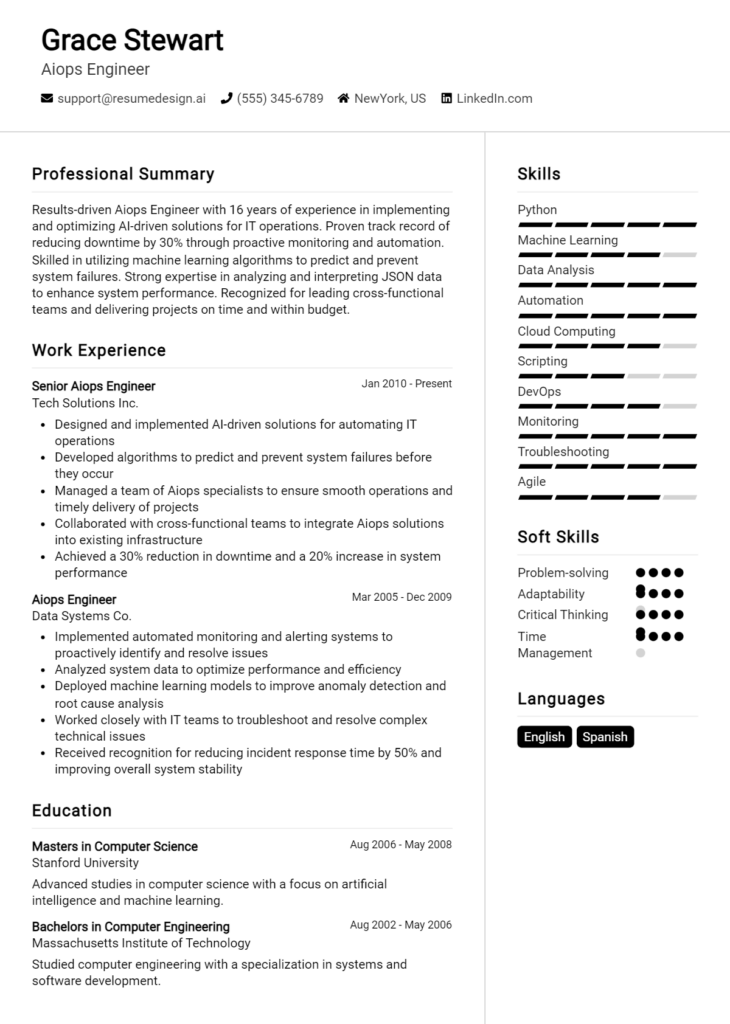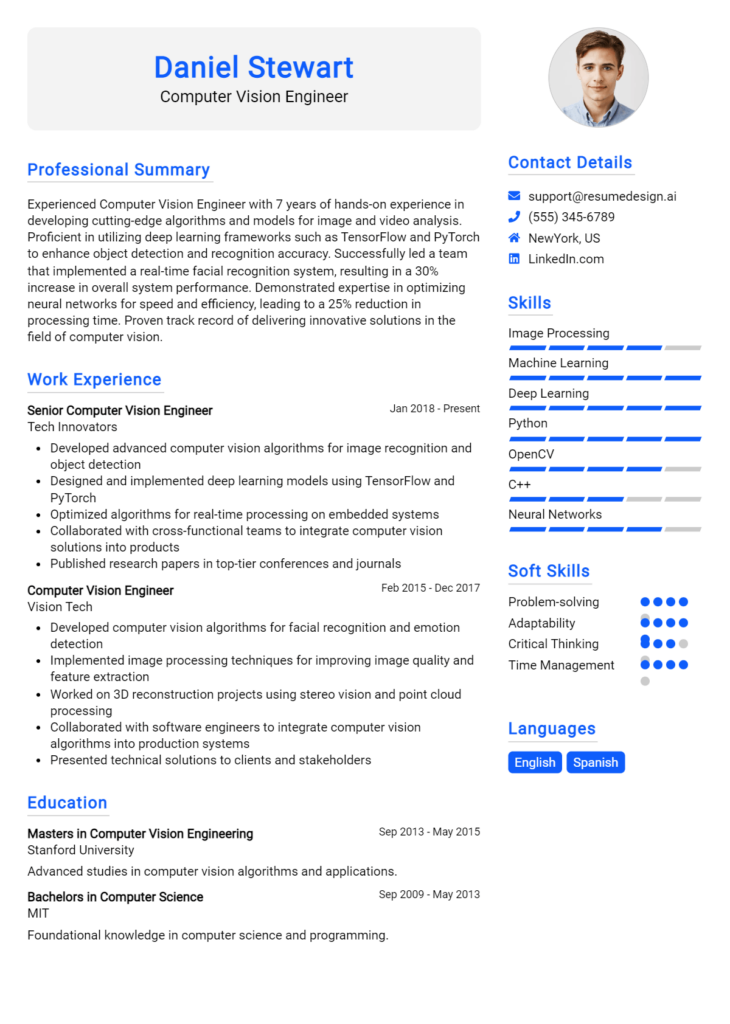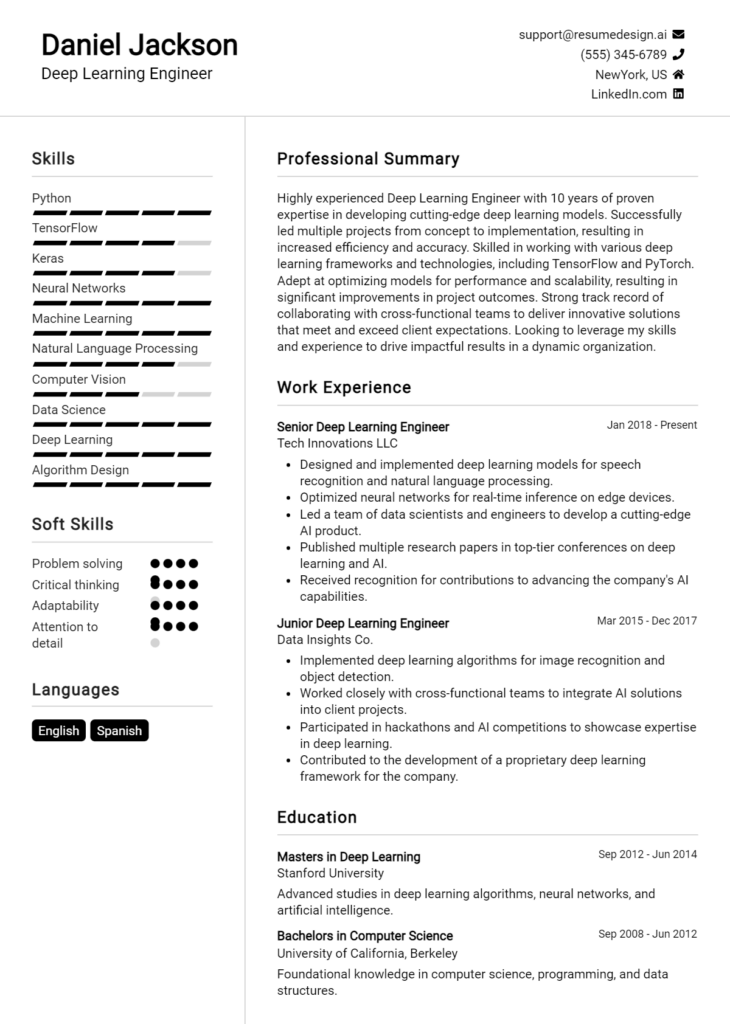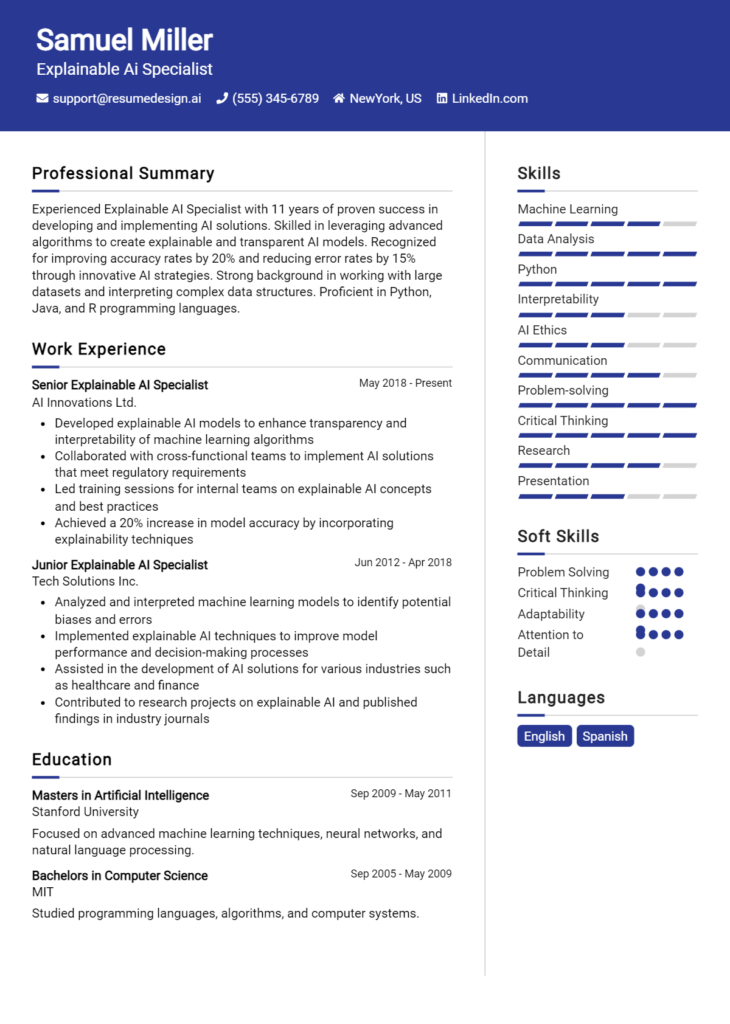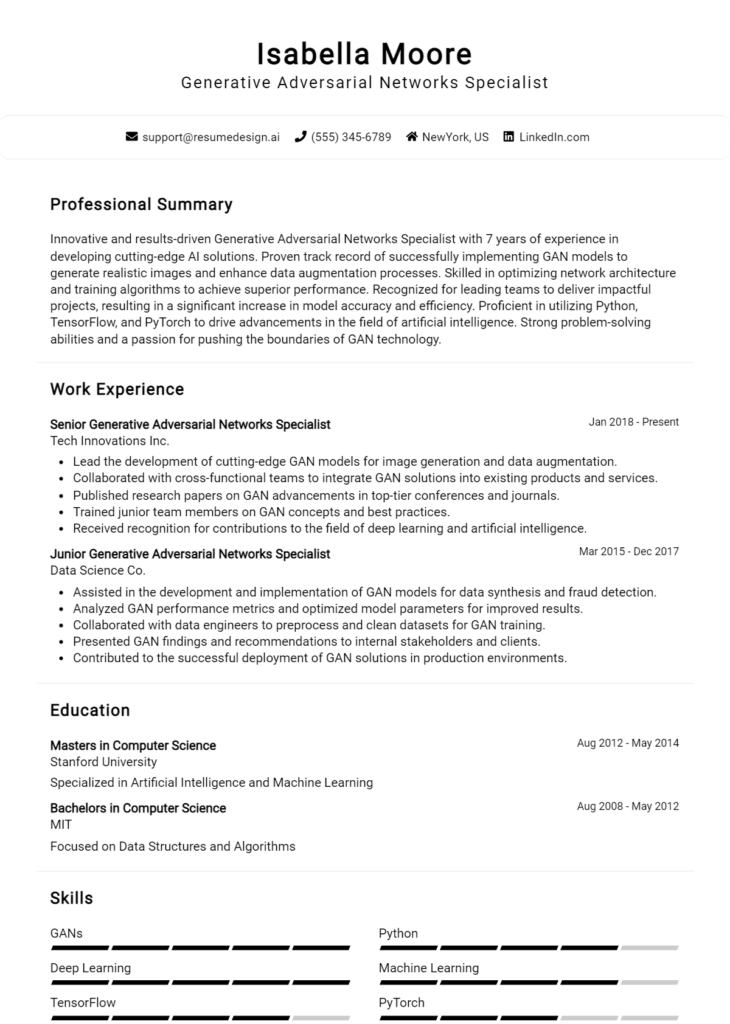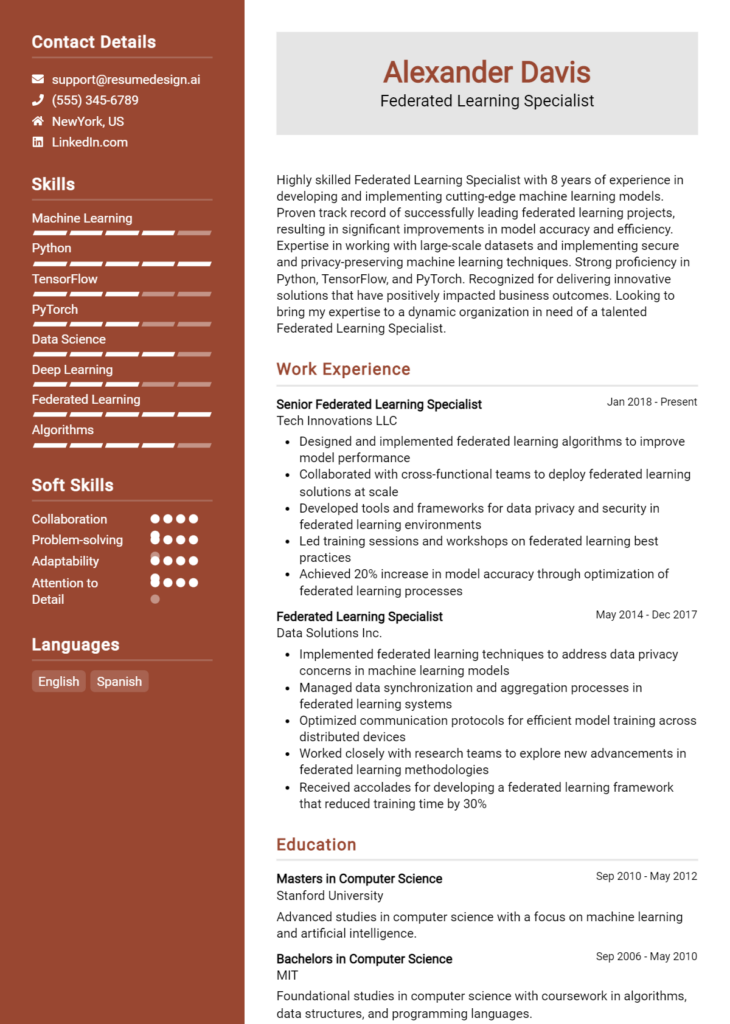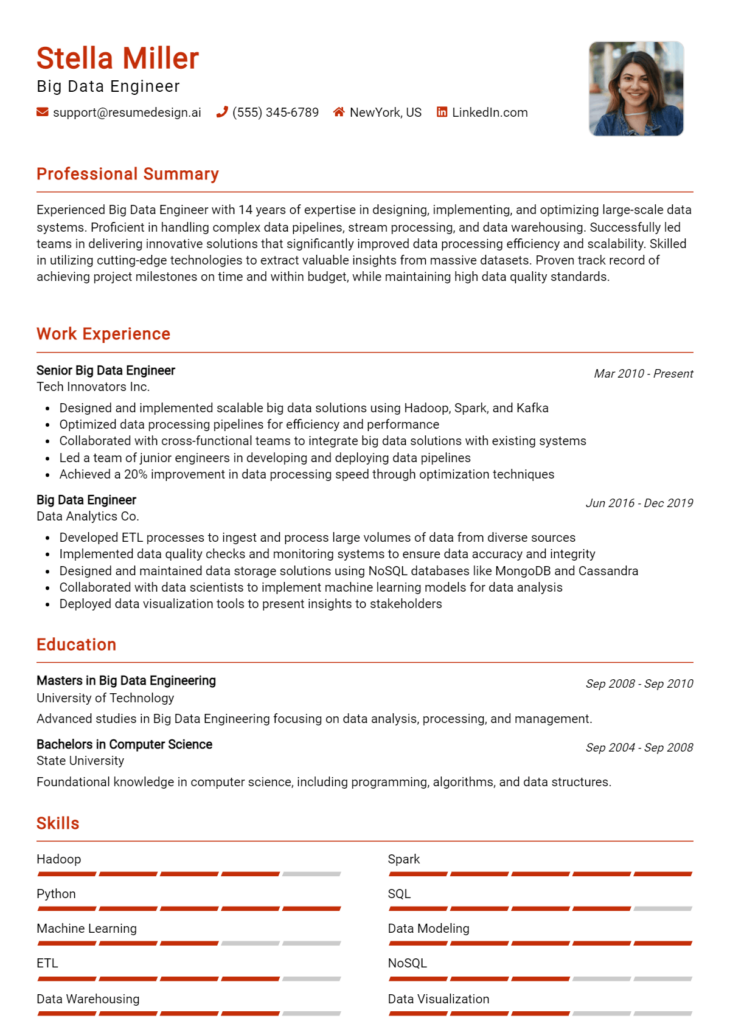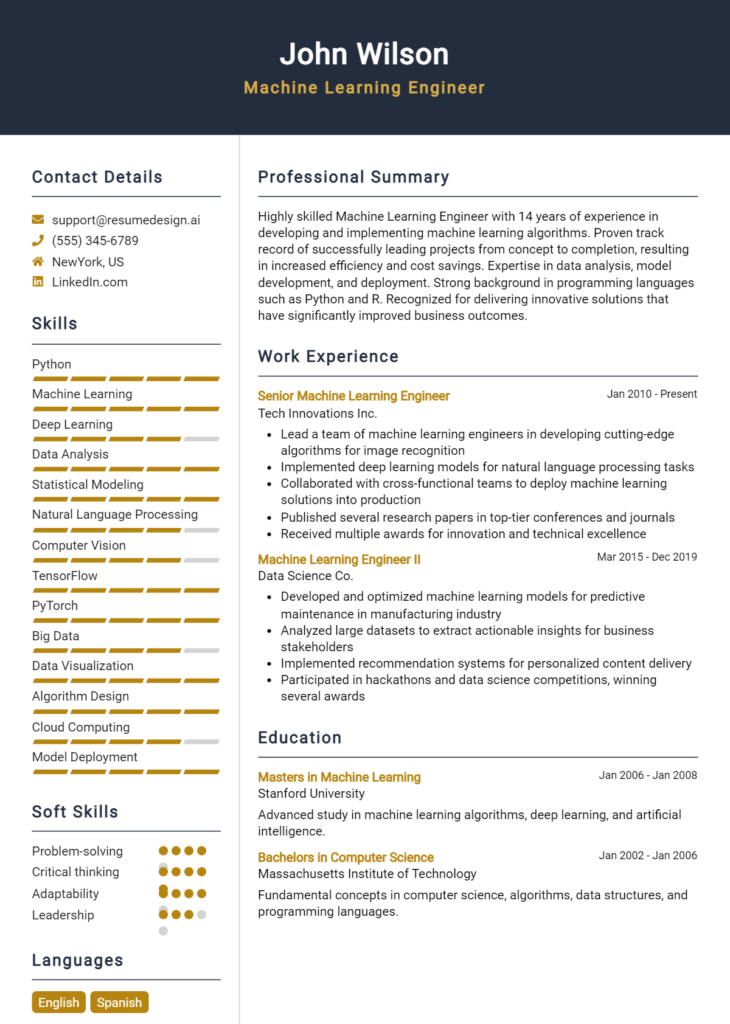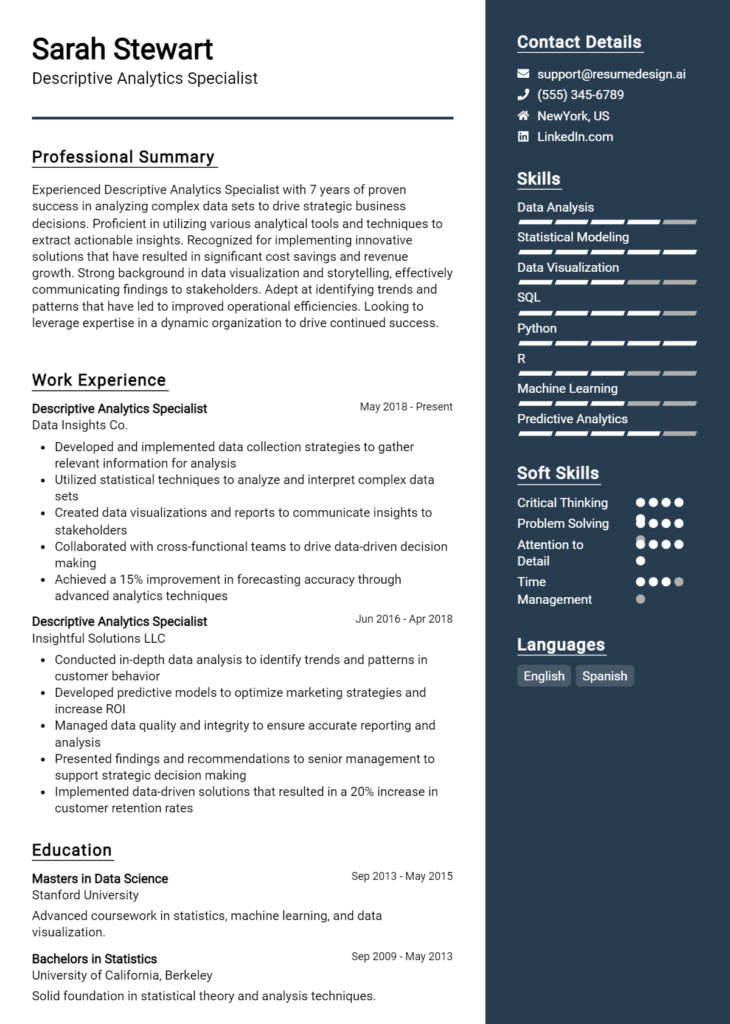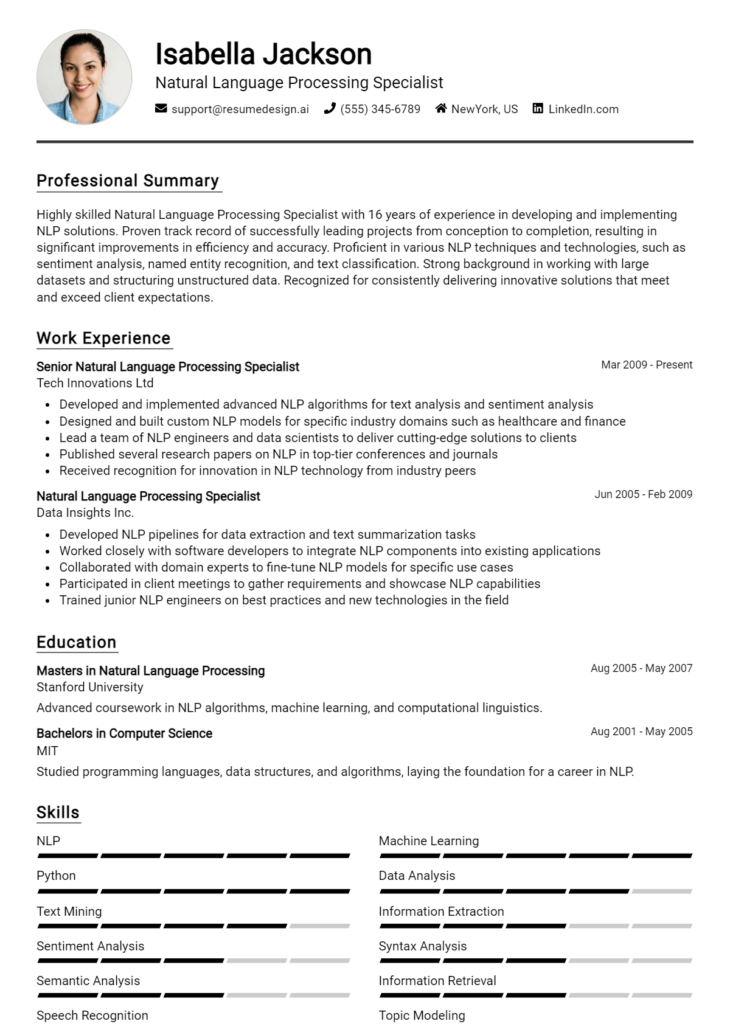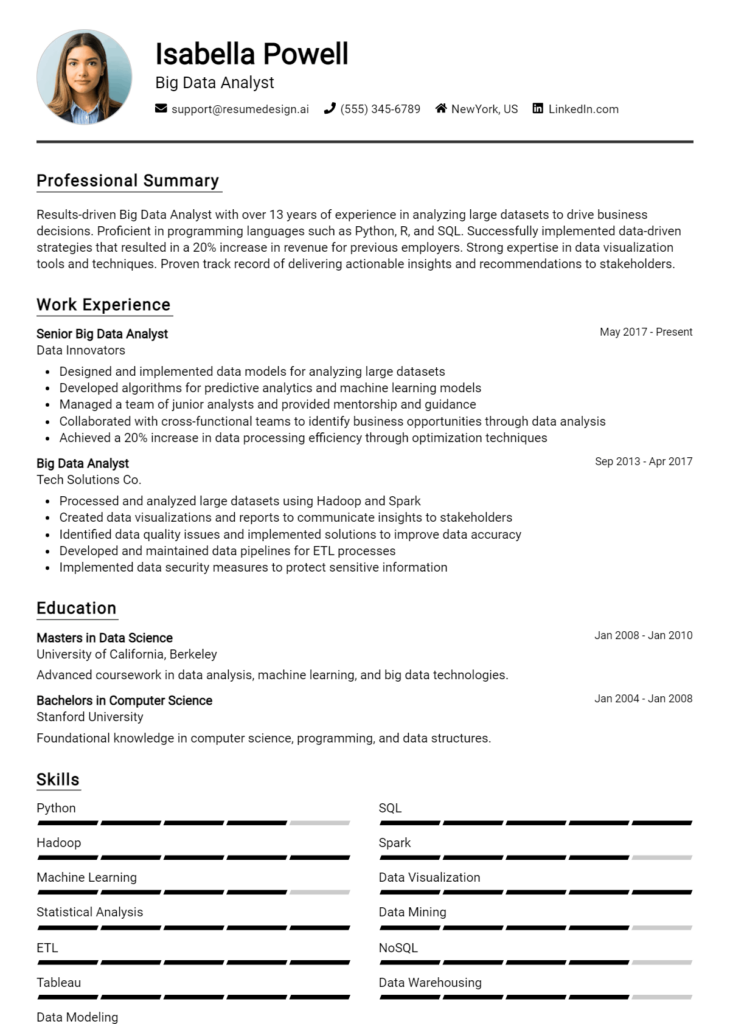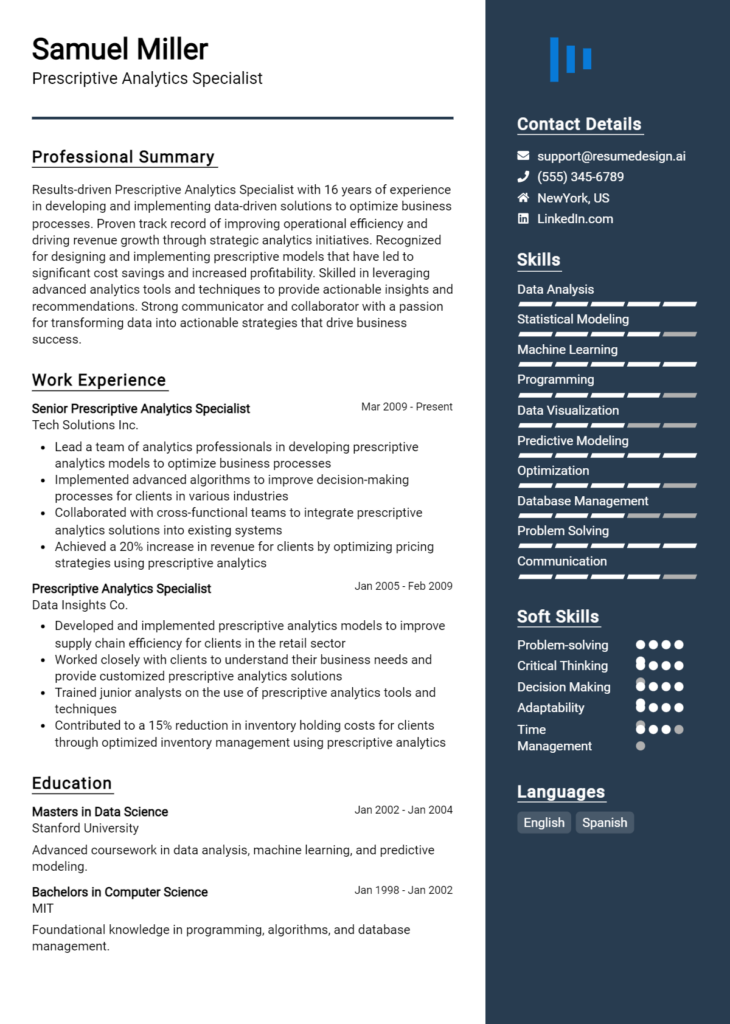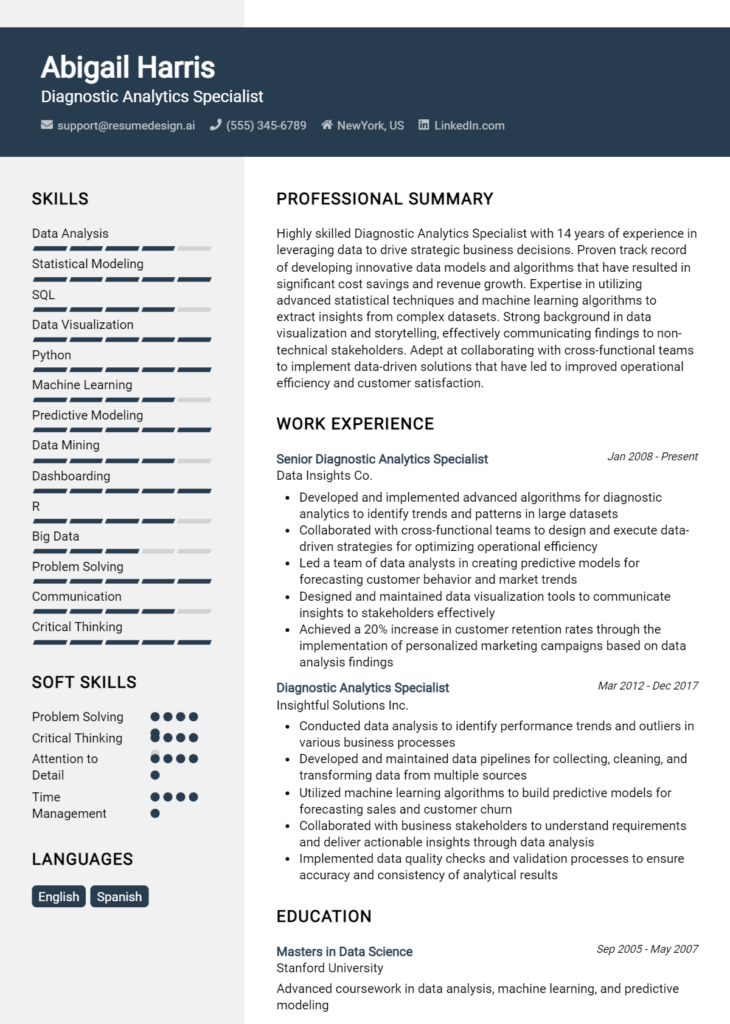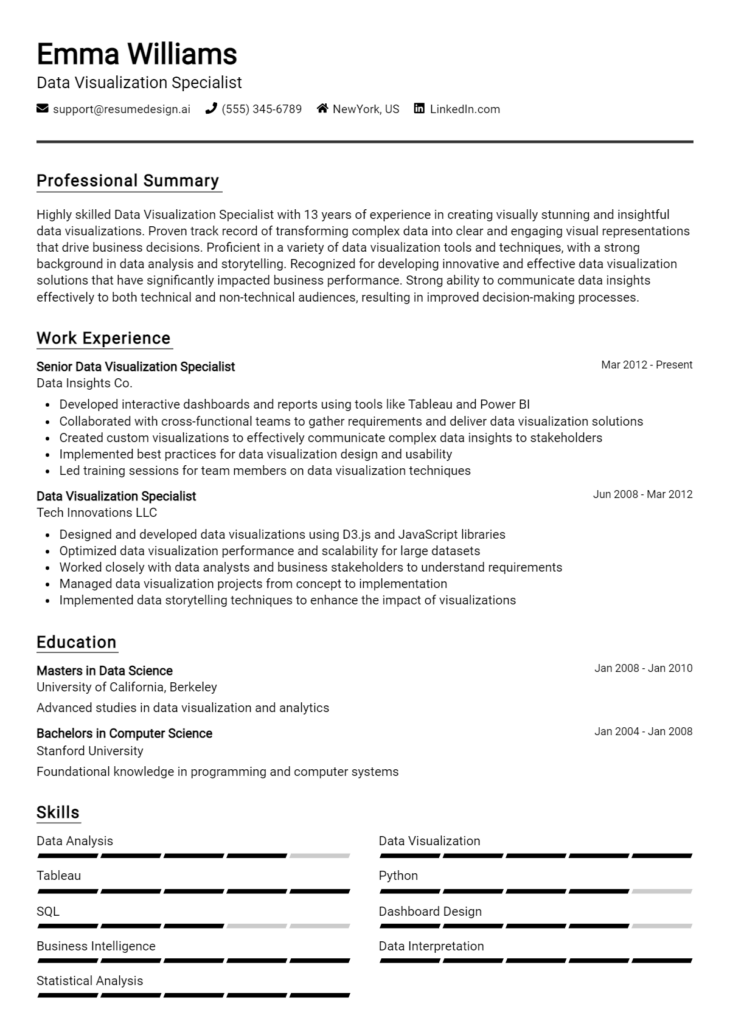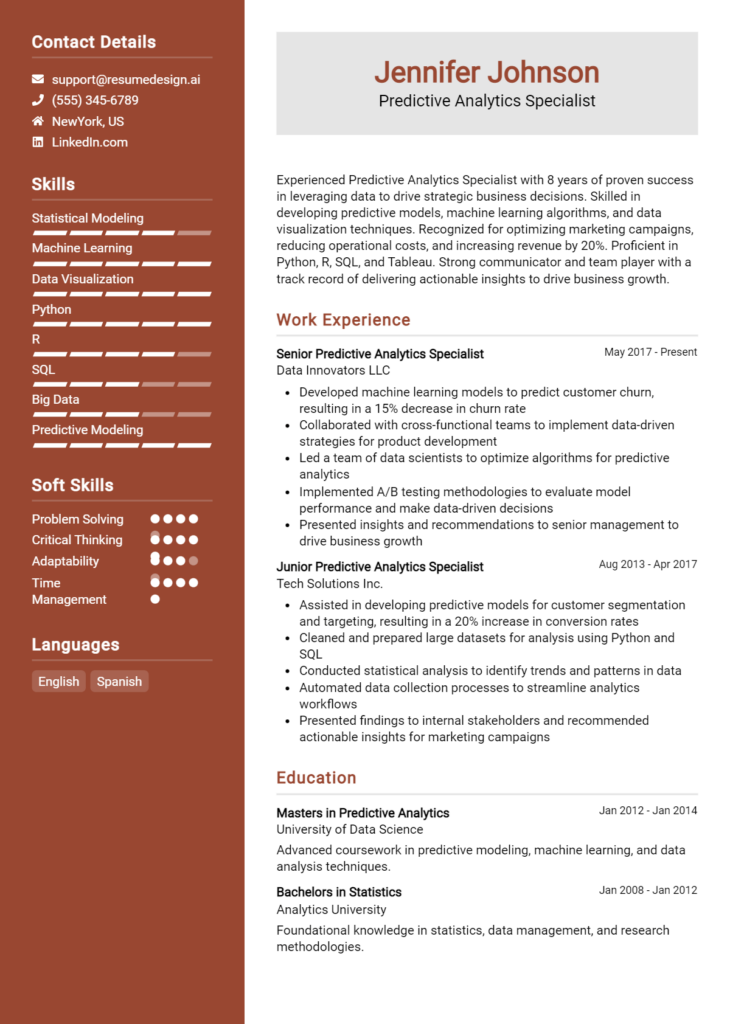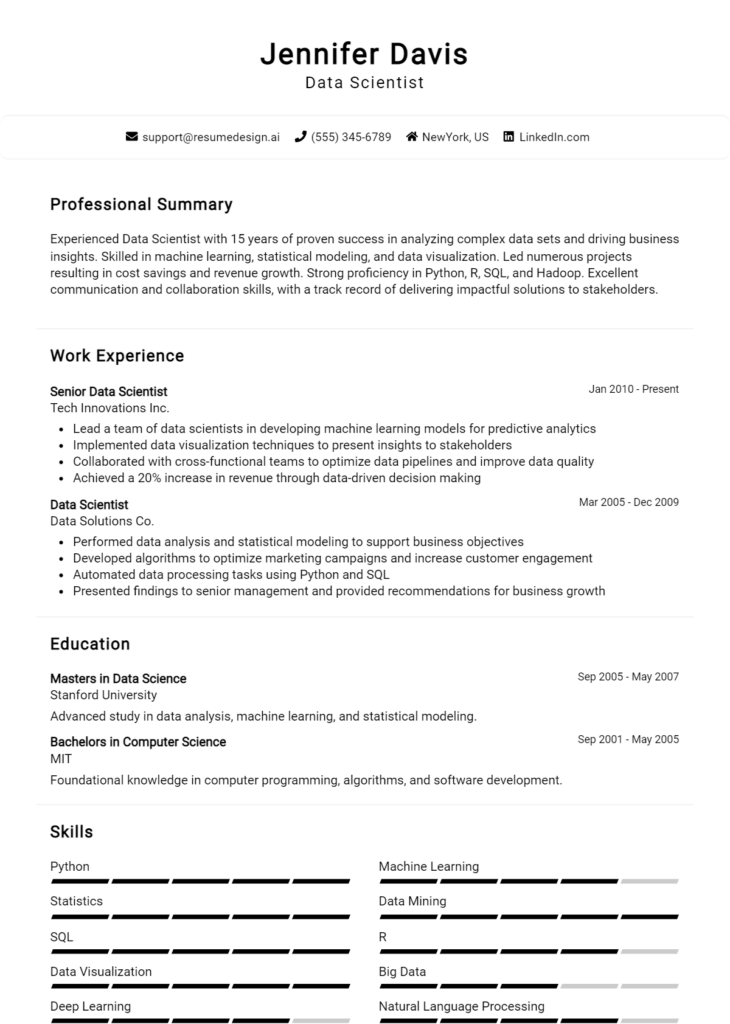Business Analytics Specialist Core Responsibilities
A Business Analytics Specialist plays a crucial role in bridging various departments by leveraging data to drive informed decision-making. Key responsibilities include analyzing complex datasets to identify trends, creating reports for stakeholders, and collaborating with cross-functional teams to enhance operational efficiency. Essential skills encompass technical proficiency in analytics tools, strong problem-solving capabilities, and effective communication. These competencies are vital for achieving organizational goals, and a well-structured resume can effectively highlight these qualifications, showcasing a candidate's potential impact.
Common Responsibilities Listed on Business Analytics Specialist Resume
- Conduct data analysis to identify business trends and insights.
- Develop and maintain dashboards and data visualization tools.
- Collaborate with stakeholders to define analytical requirements.
- Create reports and presentations to communicate findings.
- Implement data-driven strategies to improve business processes.
- Monitor key performance indicators (KPIs) and metrics.
- Assist in data collection and management efforts.
- Perform statistical analysis to support decision-making.
- Identify opportunities for process optimization and efficiency.
- Provide training and support for analytics tools and methodologies.
- Stay updated on industry trends and advancements in analytics.
- Ensure data quality and integrity throughout the analysis process.
High-Level Resume Tips for Business Analytics Specialist Professionals
In the fast-evolving field of business analytics, a well-crafted resume is not just a document; it's your ticket to making a remarkable first impression on potential employers. As a Business Analytics Specialist, your resume needs to reflect not only your technical skills and analytical prowess but also your tangible achievements in previous roles. A strong resume captures the attention of hiring managers and sets the stage for interviews, showcasing your ability to drive business decisions through insightful data analysis. In this guide, we’ll provide practical and actionable resume tips specifically tailored for Business Analytics Specialist professionals, ensuring you present yourself as the ideal candidate for the job.
Top Resume Tips for Business Analytics Specialist Professionals
- Tailor your resume to align with the job description by incorporating relevant keywords and phrases.
- Focus on showcasing your relevant experience in data analysis, reporting, and business intelligence.
- Quantify your achievements by using metrics that demonstrate your impact, such as percentage improvements or cost savings.
- Highlight industry-specific skills, including familiarity with analytics tools like SQL, Python, or Tableau.
- Include a summary statement at the top that encapsulates your experience and key strengths in business analytics.
- Use action verbs to describe your responsibilities and accomplishments, making your contributions sound dynamic and impactful.
- Incorporate projects or case studies that illustrate your analytical process and problem-solving abilities.
- Keep the format clean and professional, ensuring it is easy to read and visually appealing.
- Consider adding certifications or relevant coursework that enhances your qualifications in analytics.
By implementing these tips, you can significantly increase your chances of landing a job in the Business Analytics Specialist field. A polished resume that effectively communicates your skills, experience, and accomplishments will not only attract the attention of hiring managers but also position you as a standout candidate in this competitive job market.
Why Resume Headlines & Titles are Important for Business Analytics Specialist
In the competitive field of business analytics, a well-crafted resume headline or title serves as a critical first impression for potential employers. A strong headline can immediately capture the attention of hiring managers, providing a succinct summary of a candidate's key qualifications and areas of expertise in one impactful phrase. It should be concise, relevant, and directly tied to the specific job being applied for, ensuring that the candidate stands out amidst a sea of applications. An effective resume headline acts as a gateway, inviting recruiters to delve deeper into the resume and learn more about the applicant’s skills and experiences.
Best Practices for Crafting Resume Headlines for Business Analytics Specialist
- Keep it concise: Aim for a headline that is one to two lines long.
- Be role-specific: Tailor your headline to reflect the specific job title you are applying for.
- Highlight key skills: Include essential skills that are relevant to business analytics, such as data analysis, statistical modeling, or predictive analytics.
- Use impactful language: Choose strong action verbs and industry-specific terminology to convey expertise.
- Showcase relevant experience: Reference your years of experience or notable achievements in the field.
- Avoid jargon: Use clear language that can be easily understood by hiring managers.
- Make it unique: Differentiate yourself by incorporating personal branding elements that reflect your professional identity.
- Align with the job description: Incorporate keywords from the job posting to increase relevance and visibility.
Example Resume Headlines for Business Analytics Specialist
Strong Resume Headlines
Data-Driven Business Analytics Specialist with 5+ Years of Experience in Predictive Modeling and Data Visualization
Results-Oriented Analyst Specializing in Big Data Solutions and Business Intelligence Strategies
Business Analytics Expert with Proven Track Record in Driving Revenue Growth through Data Insights
Weak Resume Headlines
Business Analyst
Data Professional Seeking Opportunities
The strong headlines are effective because they clearly communicate the candidate’s qualifications, relevant experience, and specific skills that align with the business analytics role. They use impactful language and provide a snapshot of what the candidate brings to the table, making them memorable and appealing to hiring managers. In contrast, the weak headlines fail to impress due to their vagueness and lack of specificity, which do not convey any unique value or insight into the candidate's capabilities, making it difficult for hiring managers to see why they should consider these applicants for the job.
Writing an Exceptional Business Analytics Specialist Resume Summary
A well-crafted resume summary is crucial for a Business Analytics Specialist as it serves as the first impression potential employers have of a candidate. In a competitive job market, a strong summary quickly captures the attention of hiring managers by succinctly showcasing key skills, relevant experience, and notable accomplishments. This brief overview should be concise, impactful, and tailored to the specific job the candidate is applying for, ensuring that it highlights the most relevant qualifications that align with the needs of the organization.
Best Practices for Writing a Business Analytics Specialist Resume Summary
- Quantify Achievements: Use numbers and metrics to demonstrate your impact and success in previous roles.
- Focus on Relevant Skills: Highlight specific skills related to business analytics, such as data analysis, statistical modeling, or data visualization.
- Tailor for the Job Description: Customize your summary to align with the specific requirements and responsibilities outlined in the job posting.
- Keep It Concise: Aim for 2-4 sentences that deliver a clear and compelling message without unnecessary fluff.
- Showcase Industry Knowledge: Mention familiarity with industry-specific tools or methodologies that are relevant to the role.
- Include Soft Skills: Highlight essential soft skills like problem-solving, communication, and teamwork that complement your technical abilities.
- Use Action Verbs: Start sentences with strong action verbs to convey proactivity and impact.
- Maintain a Professional Tone: Ensure the language used is professional and reflects the industry standards.
Example Business Analytics Specialist Resume Summaries
Strong Resume Summaries
Results-driven Business Analytics Specialist with over 5 years of experience in leveraging data-driven insights to enhance business performance. Successfully increased revenue by 20% for a leading retail company through predictive analytics and customer segmentation strategies.
Detail-oriented analyst skilled in SQL and Python, with a proven track record of optimizing operational processes. Developed a dashboard that improved reporting efficiency by 30%, enabling timely decision-making across departments.
Dynamic Business Analytics Specialist with expertise in machine learning and data visualization. Spearheaded a project that reduced churn rate by 15% through advanced customer insights analysis, resulting in a significant increase in customer retention.
Weak Resume Summaries
Experienced analyst looking for opportunities in business analytics. Good with data and analytics tools.
Business Analytics Specialist with some experience in data analysis. Interested in helping companies improve.
The examples provided illustrate the distinction between strong and weak resume summaries. Strong summaries effectively quantify achievements, utilize specific skills, and demonstrate direct relevance to the role, making them compelling and memorable. In contrast, weak summaries lack detail, specificity, and measurable outcomes, failing to capture the attention of hiring managers or communicate the candidate's true capabilities.
Work Experience Section for Business Analytics Specialist Resume
The work experience section of a Business Analytics Specialist resume is a critical component that provides potential employers with insight into the candidate's professional journey and capabilities. This section not only highlights the technical skills acquired throughout the candidate's career but also demonstrates their ability to manage teams and deliver high-quality products. By quantifying achievements and aligning experiences with industry standards, candidates can effectively showcase their impact in previous roles, making them more appealing to prospective employers.
Best Practices for Business Analytics Specialist Work Experience
- Focus on quantifiable achievements, using metrics to illustrate success.
- Highlight relevant technical skills, such as proficiency in analytics tools and programming languages.
- Demonstrate leadership capabilities by detailing team management and project oversight.
- Showcase collaboration efforts, emphasizing teamwork and cross-functional projects.
- Align experiences with industry standards and expectations for the role.
- Use action verbs to convey responsibility and accomplishments effectively.
- Tailor your experience to the job description, highlighting the most relevant tasks.
- Keep descriptions concise and focused on the impact of your work.
Example Work Experiences for Business Analytics Specialist
Strong Experiences
- Led a cross-functional team of 10 to implement a new analytics platform, resulting in a 30% increase in data processing efficiency.
- Developed predictive models that improved customer retention rates by 25%, translating to an annual revenue increase of $500K.
- Managed a project that integrated machine learning algorithms into existing workflows, reducing operational costs by 15% over six months.
- Collaborated with IT and marketing departments to launch a real-time dashboard, enhancing decision-making speed by 40%.
Weak Experiences
- Worked on various analytics projects without specifying outcomes or contributions.
- Assisted in data analysis tasks; responsibilities were not clearly defined.
- Participated in team meetings and discussions related to analytics.
- Contributed to projects in a general way without detailing specific achievements or skills used.
The examples categorized as strong experiences effectively demonstrate quantifiable outcomes, technical leadership, and collaboration, showcasing a candidate's significant contributions to their previous roles. In contrast, the weak experiences lack specificity, measurable results, and clear descriptions of responsibilities, making it difficult for employers to gauge the candidate's true capabilities and impact.
Education and Certifications Section for Business Analytics Specialist Resume
The education and certifications section of a Business Analytics Specialist resume is crucial for establishing a candidate's qualifications and expertise in the field. This section not only showcases an individual's academic background, but it also highlights relevant industry certifications and continuous learning efforts that demonstrate a commitment to professional development. By detailing pertinent coursework, specialized training, and recognized credentials, candidates can significantly enhance their credibility and align themselves with the specific requirements of the job role, making a compelling case for their suitability in the competitive landscape of business analytics.
Best Practices for Business Analytics Specialist Education and Certifications
- Focus on relevant degrees, such as a Bachelor’s or Master’s in Business Analytics, Data Science, or Statistics.
- Include industry-recognized certifications like Certified Business Analysis Professional (CBAP) or Microsoft Certified: Data Analyst Associate.
- Highlight any specialized training or workshops that pertain to analytics tools or methodologies.
- Provide a brief description of relevant coursework that directly relates to business analytics, such as Data Mining or Predictive Analytics.
- Keep the section concise but informative, ensuring that each entry adds value to your qualifications.
- Organize the information chronologically or by relevance to make it easy for hiring managers to navigate.
- Update the section regularly to reflect newly acquired qualifications or certifications.
- Consider including honors or awards received during academic tenure that are relevant to analytics.
Example Education and Certifications for Business Analytics Specialist
Strong Examples
- M.S. in Business Analytics - University of XYZ, Graduated: May 2023
- Certified Business Analysis Professional (CBAP) - International Institute of Business Analysis, Earned: June 2022
- Coursework: Predictive Analytics, Data Visualization, and Statistical Methods for Decision Making.
- Data Science Bootcamp - ABC Training Institute, Completed: August 2021
Weak Examples
- B.A. in History - University of ABC, Graduated: May 2010
- Certification in Microsoft Word - Online Learning Platform, Earned: January 2020
- Completed a workshop on Office Management, August 2019
- High School Diploma - Local High School, Graduated: June 2006
The examples provided illustrate a clear distinction between strong and weak qualifications for a Business Analytics Specialist. Strong examples feature relevant degrees and certifications that are recognized in the industry, demonstrating a clear focus on business analytics and data-related fields. In contrast, weak examples consist of outdated or irrelevant qualifications that do not align with the role's requirements, failing to showcase the candidate's expertise in analytics. This comparison underscores the importance of selecting educational and certification experiences that directly support career objectives in business analytics.
Top Skills & Keywords for Business Analytics Specialist Resume
In the competitive field of business analytics, having the right skills is crucial for standing out to potential employers. A well-crafted resume that highlights both hard and soft skills can significantly enhance a candidate's chances of securing an interview. Employers seek professionals who not only possess technical expertise but also demonstrate strong interpersonal abilities. By showcasing relevant skills in a resume, a Business Analytics Specialist can effectively communicate their qualifications and readiness to contribute to data-driven decision-making processes.
Top Hard & Soft Skills for Business Analytics Specialist
Soft Skills
- Critical Thinking
- Problem-Solving
- Communication
- Team Collaboration
- Adaptability
- Attention to Detail
- Time Management
- Analytical Mindset
- Creativity
- Leadership
Hard Skills
- Data Analysis
- Statistical Analysis
- SQL Proficiency
- Data Visualization Tools (e.g., Tableau, Power BI)
- Predictive Modeling
- Machine Learning Techniques
- Proficiency in Excel
- Database Management
- Knowledge of Business Intelligence (BI) Software
- Familiarity with Programming Languages (e.g., Python, R)
Incorporating these skills into a work experience section can further demonstrate a candidate's ability to apply their knowledge in real-world scenarios, making them a valuable asset to any organization.
Stand Out with a Winning Business Analytics Specialist Cover Letter
I am writing to express my interest in the Business Analytics Specialist position at [Company Name] as advertised on [Job Board/Company Website]. With a strong background in data analysis, business intelligence, and statistical modeling, I am excited about the opportunity to leverage my skills to drive data-informed decision-making and contribute to your organization's growth objectives. My experience in translating complex data into actionable insights aligns well with your team’s mission to enhance operational efficiency and optimize business strategies.
In my previous role at [Previous Company Name], I successfully led multiple projects that involved gathering, analyzing, and interpreting large datasets to uncover trends and patterns. By utilizing advanced analytical tools such as SQL, Python, and Tableau, I was able to provide key stakeholders with clear visualizations and reports that informed strategic initiatives. One notable achievement was a project where my insights led to a 15% reduction in operational costs and a significant increase in customer satisfaction scores. I believe that my proactive approach to problem-solving and my ability to communicate technical concepts to non-technical audiences would make me a valuable asset to your team.
Moreover, I am particularly drawn to [Company Name] because of your commitment to innovation and data-driven solutions. I am eager to contribute to your efforts in harnessing the power of analytics to enhance customer experiences and drive business growth. I am confident that my analytical mindset, coupled with my collaborative spirit, will enable me to thrive in your dynamic environment and help achieve your strategic goals.
I look forward to the opportunity to discuss how my skills and experiences align with the needs of your team. Thank you for considering my application. I am excited about the prospect of contributing to [Company Name] and am available at your earliest convenience for an interview.
Common Mistakes to Avoid in a Business Analytics Specialist Resume
Crafting a resume as a Business Analytics Specialist requires a keen understanding of both analytical skills and effective communication. Many candidates make common mistakes that can undermine their chances of landing an interview. By being aware of these pitfalls, you can enhance your resume and present yourself as a strong candidate. Here are some common mistakes to avoid:
Vague Job Descriptions: Failing to provide specific details about previous roles can leave hiring managers questioning your actual responsibilities and achievements. Use quantifiable metrics to showcase your impact.
Ignoring Keywords: Many companies use Applicant Tracking Systems (ATS) to screen resumes. Not including relevant keywords related to business analytics or specific software tools can lead to your resume being overlooked.
Overloading with Technical Jargon: While it's important to demonstrate your technical skills, overloading your resume with jargon can make it difficult for non-technical reviewers to understand your qualifications. Balance technical terms with clear explanations.
Neglecting Soft Skills: Business analytics is not just about numbers. Failing to highlight soft skills like communication, teamwork, and problem-solving can make your resume one-dimensional.
Using a Generic Format: A one-size-fits-all resume can come off as impersonal. Tailor your resume to the specific job you're applying for to demonstrate your genuine interest and alignment with the role.
Lack of Focus on Results: Simply listing responsibilities without mentioning outcomes fails to convey the value you brought to previous positions. Highlight achievements and improvements that resulted from your analyses.
Inconsistent Formatting: A cluttered or inconsistent format can distract from your qualifications. Ensure your resume is well-organized, with consistent fonts, colors, and spacing for a professional appearance.
Omitting Relevant Projects: If you have worked on significant projects outside of formal employment, be sure to include them. Relevant projects can showcase your skills and practical experience, making you a more compelling candidate.
Conclusion
As a Business Analytics Specialist, your role is pivotal in transforming data into actionable insights that drive strategic decision-making. Throughout this article, we've explored the essential skills required for this position, including proficiency in data analysis tools, statistical techniques, and effective communication. We also discussed the importance of understanding business operations and how to leverage analytics to enhance performance and efficiency.
In addition to technical expertise, highlighting relevant experience and showcasing successful projects on your resume can set you apart from other candidates. Remember, your resume is not just a reflection of your skills but also a narrative of your professional journey.
Now is the perfect time to review your Business Analytics Specialist resume. Ensure that it effectively communicates your capabilities and aligns with industry standards. To assist you in this process, consider utilizing valuable resources such as resume templates, which can provide a structured format to showcase your skills. Additionally, a resume builder can help streamline the creation of your resume, while resume examples can inspire you with ideas on how to present your experience. Don’t forget to complement your resume with a compelling cover letter template to further enhance your application.
Take action today and refine your resume to elevate your career as a Business Analytics Specialist!

